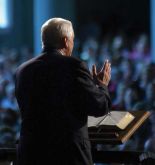
by: Rev. Ed Smelser, Bridges for Peace

Michael Spivak/shutterstock.com
“How odd of God to choose the Jews; but not so odd as those who choose the Jewish God but spurn the Jews.”—William Norman Ewer & T. E. Brown
“I say then, God has not rejected His people, has He? May it never be! For I too am an Israelite, a descendant of Abraham, of the tribe of Benjamin. God has not rejected His people whom He foreknew…”—Paul the Apostle, Romans 11:1–2 (NASB)
I’ve been a pastor for 35 years. For the first 22 years of my ministry, I unwittingly made a familiar mistake in studying the Scriptures. Having been self-taught from a Bible with misleading paragraph titles, I consistently blessed the Church and cursed Israel. I did not understand that to curse Israel was to receive God’s curse. I used the Scriptures to give encouragement and direction to my congregations by applying all Scripture to the Church. If the reference was to the Church, the application was literal. If the Scripture dealt with Israel, Jerusalem, the Jewish people, Zion, or anything pertinent to God’s dealings with His chosen people, that passage was spiritualized to refer to the Church. Yet, I applied the judgments and curses to Israel. I was teaching Replacement Theology without knowing that my beliefs had a name; I was effectively teaching heresy, almost weekly, from my church pulpit.
 Yet, I prayed daily for my church to be blessed. My prayers were answered in a series of events that led me to Israel and changed my life in a way I would not have foreseen. My journey began when I was confronted by a man who followed me into my church office one Sunday after the morning sermon and asked, “What do you know about Israel?” I had studied only surveys about the Hebrew Scripture and Israel in college. This was reinforced by the references in my study Bible, I believed there was no more to Israel than their history of rebellion and rejection against God. I told him as much and asked, “Is there more I should know?”
Yet, I prayed daily for my church to be blessed. My prayers were answered in a series of events that led me to Israel and changed my life in a way I would not have foreseen. My journey began when I was confronted by a man who followed me into my church office one Sunday after the morning sermon and asked, “What do you know about Israel?” I had studied only surveys about the Hebrew Scripture and Israel in college. This was reinforced by the references in my study Bible, I believed there was no more to Israel than their history of rebellion and rejection against God. I told him as much and asked, “Is there more I should know?”
The man’s challenge jolted me. “The first thing you must do is go to Israel. And so that you will know that Israel is important to God, I will tell you what is going to happen to you.” I knew and admired this man. He was not a person to speak quickly or lightly, particularly concerning spiritual matters. He named four specific things that he said would happen to me in the next 10 days to let me know that “Israel was important to God.” All four things happened, just as he said. It was the beginning of a journey that continues to show me more clearly each day that “Israel is important to God; He still loves the Jewish people, and their destiny in Him is bright.”

Israel is important to God! www.israelimages.com
Mine was not an isolated case. Don Finto—well-known pastor of Belmont Church in Nashville, Tennessee in the United States for more than 25 years— says, “I had read the Bible for years, but I read the Hebrew Scriptures only as history. In my annual reading through the Bible, I was relieved to get to the New Testament…Except for those occasional clear words that foretold of Jesus’s coming, I would almost speed read the prophets in order to get through them…I assumed the prophets were speaking symbolically and meant the advance[ment] of the gospel. If I did not understand a passage, I either ignored it or spiritualized it. ‘Israel’ was the Church. ‘Israel’s sins’ were the sins of the Church. ‘Jerusalem’ was a figure of heaven. ‘Zion’ was another name for the people of God.”
 Replacement Theology, also known as Supersessionism, teaches that the people of Israel have forfeited their special status as the chosen people of God and have been replaced by the Church. The Church, then, is the new true Israel. A dictionary of Church history lists Replacement Theology as a doctrinal teaching that originated in the early Church. For nearly 1,900 years, it has been the fertile soil from which Christian anti-Semitism has grown, ever infecting the Church.
Replacement Theology, also known as Supersessionism, teaches that the people of Israel have forfeited their special status as the chosen people of God and have been replaced by the Church. The Church, then, is the new true Israel. A dictionary of Church history lists Replacement Theology as a doctrinal teaching that originated in the early Church. For nearly 1,900 years, it has been the fertile soil from which Christian anti-Semitism has grown, ever infecting the Church.
This school of thought is built on the premise that, due to the rejection of Yeshua (Jesus) by the Jewish people as their sought-after Messiah and Savior, God rejected them. The Church has become the continuation of the Jewish people and their Land—by scriptural proof and by deferred covenantal standing—to the exclusion of the former. The Jewish people are no longer the chosen people. They have no exclusivity from any other nationality or people group as it pertains to the purposes of God. Apart from repentance, the new birth, and incorporation into the Church, the Jewish people have no future, no hope, and no calling in the plan of God.
 Replacement Theology teaches that beginning with the vision of Peter in Acts 10 (mandating the inclusion of the Gentiles into the household of faith), the term “Israel”—as found in the New Testament—now refers to the Church. The promises, covenants, and blessings ascribed to Israel in the Older Testament have been taken away from them and given to the Church, which has superseded them. However, the Jewish people are subject to the curses found in the Bible—a result of their history of rejection and rebellion against the God of their forefathers. There are key questions that need to be leveled at Replacement Theology, so that Christians can clearly understand the importance and dangers of this teaching.
Replacement Theology teaches that beginning with the vision of Peter in Acts 10 (mandating the inclusion of the Gentiles into the household of faith), the term “Israel”—as found in the New Testament—now refers to the Church. The promises, covenants, and blessings ascribed to Israel in the Older Testament have been taken away from them and given to the Church, which has superseded them. However, the Jewish people are subject to the curses found in the Bible—a result of their history of rejection and rebellion against the God of their forefathers. There are key questions that need to be leveled at Replacement Theology, so that Christians can clearly understand the importance and dangers of this teaching.
Why has Replacement Theology remained strong, even in light of a growing list of fulfilled Bible prophecies? Simply, it appears to have history on its side. A fundamental assumption of Replacement Theology is that, because Israel rejected Yeshua as Messiah, God has cast off the Jewish people as a chosen nation once and for all. God dispersed the Jewish people into the nations as a judgment. The land of Canaan was forfeited, and Israel could no longer make a legal claim to it. When the demise of the Jewish people since the first century is examined, Replacement Theology would appear to have history on its side.
 On the surface, the historical evidence is substantial. Within a generation of the crucifixion of Yeshua, the Roman army ransacked the city of Jerusalem, totally destroyed the Temple, uprooted the Jewish people from the Land, and carried them off to various corners of the empire. The early Church fathers, who looked at these historical events, were convinced that this was positive proof that God was finished with Israel and that the Church had assumed Israel’s former role in the purposes of God.
On the surface, the historical evidence is substantial. Within a generation of the crucifixion of Yeshua, the Roman army ransacked the city of Jerusalem, totally destroyed the Temple, uprooted the Jewish people from the Land, and carried them off to various corners of the empire. The early Church fathers, who looked at these historical events, were convinced that this was positive proof that God was finished with Israel and that the Church had assumed Israel’s former role in the purposes of God.
The sufferings of the Jewish people did not end with the cruel Roman legions. The history of the Jewish people since that time has been filled with tragedy. For Replacement Theology proponents, this sad history confirms the belief that God is, indeed, finished with Israel. Their argument, however, is a circular argument. In reality, the horrible suffering of the Jewish people has been, in many respects, the result of Replacement Theology, rather than a cause for it. If anti-Semitism had never invaded the Church, many of the atrocities afflicted upon the Jewish people during the past 2,000 years would never have happened.
 Hundreds of years of global persecution does not mean that God has rejected the Jewish people as His chosen people. Their history, even over the past 1,000 years, is actually a stronger argument against Replacement Theology than for it. As horrible as it has been, their history is not a sign of God’s rejection, but rather a sign of God’s absolute faithfulness to His Word as it regards His chosen people.
Hundreds of years of global persecution does not mean that God has rejected the Jewish people as His chosen people. Their history, even over the past 1,000 years, is actually a stronger argument against Replacement Theology than for it. As horrible as it has been, their history is not a sign of God’s rejection, but rather a sign of God’s absolute faithfulness to His Word as it regards His chosen people.
Recent Jewish history debunks Replacement Theology even further. The establishment of the nation of Israel and the return of the scattered Jewish people back to their Land is unprecedented in history. No other people have been dispersed for 2,000 years and then returned to their ancient land. If God has cast off the Jewish people and no longer has any interest in Israel’s continued existence as a corporate people and rebirth as a nation, how did the Jewish people manage to rise out of the ashes of the Holocaust and establish a sovereign state on the same piece of real estate that they had lost 2,000 years ago? What we are witnessing today is a divine miracle of the first order—a literal fulfillment of biblical prophecy.
And what can explain the perpetuity of the Jewish people? The only, faithful, covenant-keeping God of Israel has kept His people in the palm of His hand. “I the LORD do not change. So you, O descendants of Jacob, are not destroyed” (Mal. 3:6, NIV). There is simply no other ethnic group in the history of mankind that has faced such odds and yet survived to flourish again. To observe the enduring existence of Israel in history is cause for rejoicing. God continues to be faithful to His covenant people Israel, and He will also be faithful to those who have become part of the commonwealth of Israel by faith. History, therefore, disproves Replacement Theology.

God remembers His promises and His covenants.
To not love the Jewish people is not a possibility with God; it is inconsistent with His character. The Israelites, “to whom pertain the adoption, the glory, the covenants, the giving of the law, the service of God, and the promises; of whom are the fathers and from whom, according to the flesh, Christ came,” are important to God (Rom. 9:4–5). The Jewish people are loved unconditionally and eternally, and “the gifts and calling of God” to them “are irrevocable” (Rom. 11:29).
With proof texts in hand, Replacement theologians demand that God treat Israel differently than He treat the Church. For instance, Replacement Theology claims forgiveness of sins for the Church, using a verse like Psalm 103:12 that God “removed our transgressions from us.” However, they disallow such forgiveness for Israel. This is not scriptural.
God remembers His promises and His covenants; they are irrevocable to the Jew and to the Gentile. The God of Abraham, Isaac, and Jacob will show grace and mercy once again to His beloved Israel. “And I will pour on the house of David and on the inhabitants of Jerusalem the Spirit of grace and supplication; then they will look on Me whom they pierced. Yes, they will mourn for Him as one mourns for his only son, and grieve for Him, as one grieves for a firstborn” (Zech. 12:10). It is time that the Church stop condemning Israel and, instead, pray for Israel like the Old Testament prophet prayed, “O LORD,…in wrath remember mercy” (Hab. 3:2).

God is keeping His eternal covenant with Abraham, Isaac, Jacob, and their offspring.
Yeshua lamented over Jerusalem, knowing that God’s mercy and forgiveness to the Jewish people was greater than their rebellion and sin, and they would not be replaced. “O Jerusalem, Jerusalem, the one who kills the prophets and stones those who are sent to her! How often I wanted to gather your children together, as a hen gathers her chicks under her wings, but you were not willing! See! Your house is left to you desolate; for I say to you, you shall see Me no more till you say, ‘Blessed is He who comes in the name of the LORD!’” (Matt. 23:37–39).
The words of Jeremiah the prophet silence Replacement Theology. “Thus says the LORD: ‘If My covenant is not with day and night, and if I have not appointed the ordinances of heaven and earth, then I will cast away the descendants of Jacob and David My servant, so that I will not take any of his descendants to be rulers over the descendants of Abraham, Isaac, and Jacob. For I will cause their captives to return, and will have mercy on them’” (Jer. 33:25–26). If the fixed laws of heaven and earth are still in force, then it can be known with certainty that God has not replaced His covenant people, Israel. He is in the process of restoring His people Israel to their Land and to Himself. He is keeping His eternal covenant with Abraham, Isaac, Jacob, and their offspring.
If God does not keep His promises to Israel—after stating 15 times in Scripture that it is an everlasting covenant—then all men are without promises and excluded from covenant relationship. If God is not going to do these things for Israel’s sake, then the Church is also without hope. But if God keeps His covenants and promises to Israel, we are assured He will keep His promises to those who have been grafted into the Olive Tree.
 Doctrine must bear examination pertinent to all Scripture. Replacement Theology is not exempt. Below are a few examples of the futility of attempting to prove Replacement Theology from any passage in the New Testament.
Doctrine must bear examination pertinent to all Scripture. Replacement Theology is not exempt. Below are a few examples of the futility of attempting to prove Replacement Theology from any passage in the New Testament.
Galatians 3:29—“And if you are Christ’s, then you are Abraham’s seed, and heirs according to the promise.” Replacement Theology teaches that to have faith in Messiah (Christ) is to become a spiritual son and heir of the covenants cut with Abraham. This inclusive promise to the Gentiles does not exclude the Jewish people or nullify their original covenant, promise, and blessing as the natural seed of Abraham. This verse simply joins Gentile Christians to what God had already started with Israel. The Church has not replaced Israel! The Church has enlarged Israel!
Matthew 21:43—“Therefore I say to you, the kingdom of God will be taken from you and given to a nation bearing the fruits of it.” Replacement Theology tries to make the point that Yeshua taught that the Jewish people would be replaced. Who was Yeshua talking about when He announced, “the kingdom will be taken from you”? He was not talking about Israel; He was speaking directly to the priests and elders of His day, who had failed.
The credibility of Replacement Theology suffers further, when the Church substitutes Israel in the biblical text. In the 77 times “Israel” appears in the New Testament, it cannot be legitimately replaced with the word “church.” The verses no longer make sense or possess contextual integrity.
Consider the following verses where I have replaced the original “Israel” with “church.”
The Scriptures lose all meaning when “church” replaces “Israel” in each text. The only way to conclude that the Church is Israel, applying all the prophecies concerning Israel to the Church, is to interpret the Scriptures by spiritualizing them, or allegorizing them, and not taking them literally.
The accusation has been leveled that the New Testament is anti-Semitic, and therefore encourages Replacement Theology. The opposite is more accurate. The writers of the New Testament were Jewish. Yes, they recorded some strong words directed at the Jewish people of the day. Even Yeshua spoke harshly to the Pharisees several times. Peter spoke pointedly to the Jewish crowds on Solomon’s Porch (Acts 3), and Paul confronted the Sanhedrin (Acts 23). However, these arguments between Jews, even critical ones, were from the vantage point of being an intracommunal debate, not intercommunal accusation.
Ephesians 2:11–18 is the summation of the relationship that must exist between the Jewish people and the Gentiles. The Gentile Church, “the Uncircumcision”—who “have now been brought near by the blood of Christ” (v.13)—does not replace “what is called the Circumcision” (v.11). Messiah, our peace, has made the Jew and the Gentile one. He has broken down the middle wall of separation to create in Himself one new man from the two, thus making peace, that He might reconcile them both to Himself in one body through the cross. Through Yeshua, we both have access by one Spirit to the Father (vv.14–18).
The Church’s identity with God must not cause us to overlook His continuing plan for Israel. The existence of the Church does not negate the existence and purpose of Israel. The Church’s identity does not depend on a denial of original Israel, but it is established in Messiah and is intertwined with Israel. The Church does not replace Israel; they are joined to Israel and the two become one.
The Jewish people can only be restored and redeemed—not replaced. There are promises in the New Testament to the Jewish people that are not equaled by any other nation or people. “And so all Israel will be saved as it is written: ‘The Deliverer will come out of Zion, and He will turn away ungodliness from Jacob; for this is My covenant with them, when I take away their sins’” (Rom. 11:26–27).
 God’s covenants to Israel are eternal. In the seed of Abraham, all the nations of the earth are blessed (Gen. 12:3); and through the seed of Abraham, Messiah came (Rom. 9:4–5). God remembers His covenant which He made with Abraham, Isaac, and Jacob. The Jewish people are Israelites, and to them still belong the sonship, the glory, the covenants, the giving of the law, the worship, and the promises (Rom. 9:4).
God’s covenants to Israel are eternal. In the seed of Abraham, all the nations of the earth are blessed (Gen. 12:3); and through the seed of Abraham, Messiah came (Rom. 9:4–5). God remembers His covenant which He made with Abraham, Isaac, and Jacob. The Jewish people are Israelites, and to them still belong the sonship, the glory, the covenants, the giving of the law, the worship, and the promises (Rom. 9:4).
Yeshua came to the Jew first, then the Greek (Rom. 1:16; Matt. 10:5–7, 15:24). Both are named because there is a distinction in the God-appointed purposes of these two equals. “There is neither Jew nor Greek, there is neither slave nor free, there is neither male nor female; for you are all one in Christ Jesus” (Gal. 3:28). Just as the role of a man and a woman are distinctly different, yet equal, so are God’s purposes for the Jew and the Gentile.
Prophecy has proved the fallibility of Replacement Theology in history. End-time prophecies, which are being fulfilled at an ever increasing pace, continue to give overwhelming support for the complete deliverance of the Jewish people (Rom. 11:26), restoration of the Jewish people to their Land, and a restored relationship to their Lord (Isa. 11, 43, 49, 60; Jer. 16; Ezek. 35–37; and the minor prophets).
 Jews are Jews, Israel is still Israel, and the Church is the Church. The Jewish people are forever God’s covenant people, and through them, all nations have been blessed. Has Israel been replaced? “Certainly not!…God has not cast away His people whom He foreknew…Even so then, at this present time there is a remnant according to the election of grace…And so all Israel will be saved, as it is written: ‘The Deliverer will come out of Zion, and He will turn away ungodliness from Jacob; for this is My covenant with them, when I take away their sins’…For the gifts and the calling of God are irrevocable…Oh, the depth of the riches both of the wisdom and knowledge of God! How unsearchable are His judgments and His ways past finding out!” (Rom. 11:1a, 2a, 5, 26, 29, 33).
Jews are Jews, Israel is still Israel, and the Church is the Church. The Jewish people are forever God’s covenant people, and through them, all nations have been blessed. Has Israel been replaced? “Certainly not!…God has not cast away His people whom He foreknew…Even so then, at this present time there is a remnant according to the election of grace…And so all Israel will be saved, as it is written: ‘The Deliverer will come out of Zion, and He will turn away ungodliness from Jacob; for this is My covenant with them, when I take away their sins’…For the gifts and the calling of God are irrevocable…Oh, the depth of the riches both of the wisdom and knowledge of God! How unsearchable are His judgments and His ways past finding out!” (Rom. 11:1a, 2a, 5, 26, 29, 33).
Bercot, David W. A Dictionary of Early Christian Beliefs. Peabody, MA: Hendrickson
Publishers, 1998.
Brown, Harold O. J. Heresies—Heresy and Orthodoxy in the History of the Church.
Peabody, MA: Hendrickson Publishers, 1984.
Hedding, Malcolm. (comment) In the entire Bible, the name Jacob is not used once to
refer, in fact or type, to the Church. “Jacob” without exception always refers to…
natural Israel.
Hilsden, Wayne. Replacement Theology. Jerusalem, Israel: Feast of Tabernacles, 2003.
Audiocassette.
Lohfink, Norbert. The Covenant Never Revoked. New York: Paulist Press, 1991.
Pawson, David. Romans 9, 10 and 11. Jerusalem, Israel: Feast of Tabernacles, 2003.
Audiocassette.
Prince, Derek. Promised Land, God’s Word and the Nation of Israel. Charlotte, NC:
Derek Prince Ministries, 1978. (Original title, The Final Word on the Middle East)
All logos and trademarks in this site are property of their respective owner. All other materials are property of Bridges for Peace. Copyright © 2025.
Website Site Design by J-Town Internet Services Ltd. - Based in Jerusalem and Serving the World.